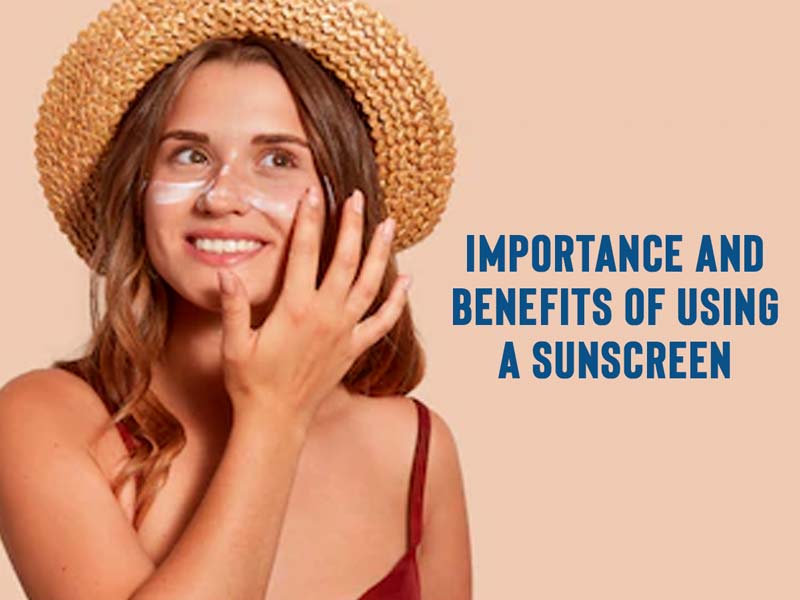
During the scorching summer months there is unbearable heat and humidity that may lead to a tanned skin. Sun tan makes the skin flakey, pale and takes away its natural glow. Too much exposure to the sun not only tans the skin but also causes skin problems like dark spots, hyper pigmentation and/or even sunburn. Henceforth, it is important to use a sunscreen both when you are indoor and/or outdoor.
Table of Content:-
What is a Sunscreen?

Sunscreen, also popularly known as sunblock or sun cream is a photoprotective topical product for the face and body that absorbs or reflects some of the sun's ultraviolet (UV) radiation. A sunscreen caters to protect the skin against sun tan, sunburn and most importantly prevents from the chances of skin cancer.
Sunscreens come as lotions, creams, sprays, gels, foams, powders and other topical products. they are common supplements to clothing, particularly sunglasses, sunhats and special sun protective clothing, and other forms of photoprotection like umbrellas.
Diligent use of a sunscreen also helps in slowing down or temporarily prevent the untimely development of wrinkles, dark spots and sagging skin.
Read more: 7 Reasons Why You Should Drink Surahi Water This Summer
How does a suncreen work?
Sunscreens are skincare solutions that contain active ingredients that protect the skin cells from the harmful ultraviolet radiation of the sun. They work by incorporating either chemical or physical active ingredients (or a combination of both) to protect skin against the UV damage.
The higher the Sun Protection Factor (SPF), the better it is. Sun Protection Factor refers as to how long the sunscreen would take the sun's UVB rays to burn skin when the product is applied. This is why it recommended by the dermatologists to use a suncreen which is atleast SPF 30 or above.
Every skin has a different type so one might need to refer to a skin doctor/dermatologist to know which one will suit them the best. The right sunscreen will give a mattifying effect which results in protecting the skin without worsening acne, pimples and breakouts.

Why you should use a sunscreen?
Before you head outside for the summer fun, it is essential to put on some sunscreen at least 15 minutes before you leave your house. One might also pack sunscreen in their bag so that it is handy if you want to re-apply. Sunscreens have many benefits, here are a few listed as why you should always use a sunscreen:
1. Protects Your Skin From UV Rays
The risk of sun damage on our skin from harmful UV rays is increasing everyday due to the depletion of ozone layer. Application of a sunscreen will block these rays, reducing the likeliness of sunburns, too.
Read more: 4 Common Sun Protection Mistakes While Using Sunscreen
2. Lowers The Skin Cancer Risk
Skin cancer is the most common form of cancer in the recent time. By applying a sunscreen each day both indoors and outdoors, one may cut their risk of contracting skin cancers by almost half.
3. Helps Maintain an Even Skin Tone

Sunscreen helps in preventing the discoloration and dark spots caused from sun damage, helping in maintaining a smoother and more even skin tone. In case you are someone who feels your skin to be oily after a sunscreen, change the product from the core basic properties of it.
4. Prevents Premature Aging of the Skin
Sun damage from the harmful UV rays causes photoaging of the skin, that in turn causes the skin to discolor by breaking down the collagen, which contributes to lines, sagging and wrinkles. Those below age 55 who apply sunscreen regularly have 24 percent less chance of developing these signs of aging.
5. Reduces Inflammation
Too much exposure to the sun and UV rays can cause severe redness on the skin and inframmation. Wearing sunscreen everday reduces the chances of inflammation and redness of the skin. However, it is also important to choose a sunscreen that is also senstive for your skin.
Therefore, it is extremely stringent to use a sunscreen in summers which will be helpful in a number of ways. If you experience any skin related issue like redness or iching, consult a dermatologist and work on with a sunscreen that suits your skin type.
Also watch this video
How we keep this article up to date:
We work with experts and keep a close eye on the latest in health and wellness. Whenever there is a new research or helpful information, we update our articles with accurate and useful advice.
Current Version